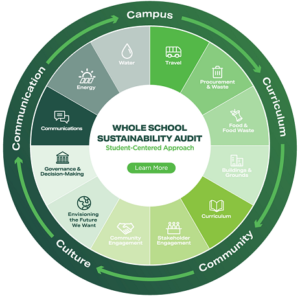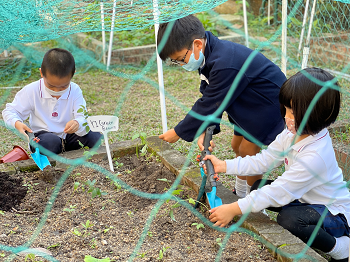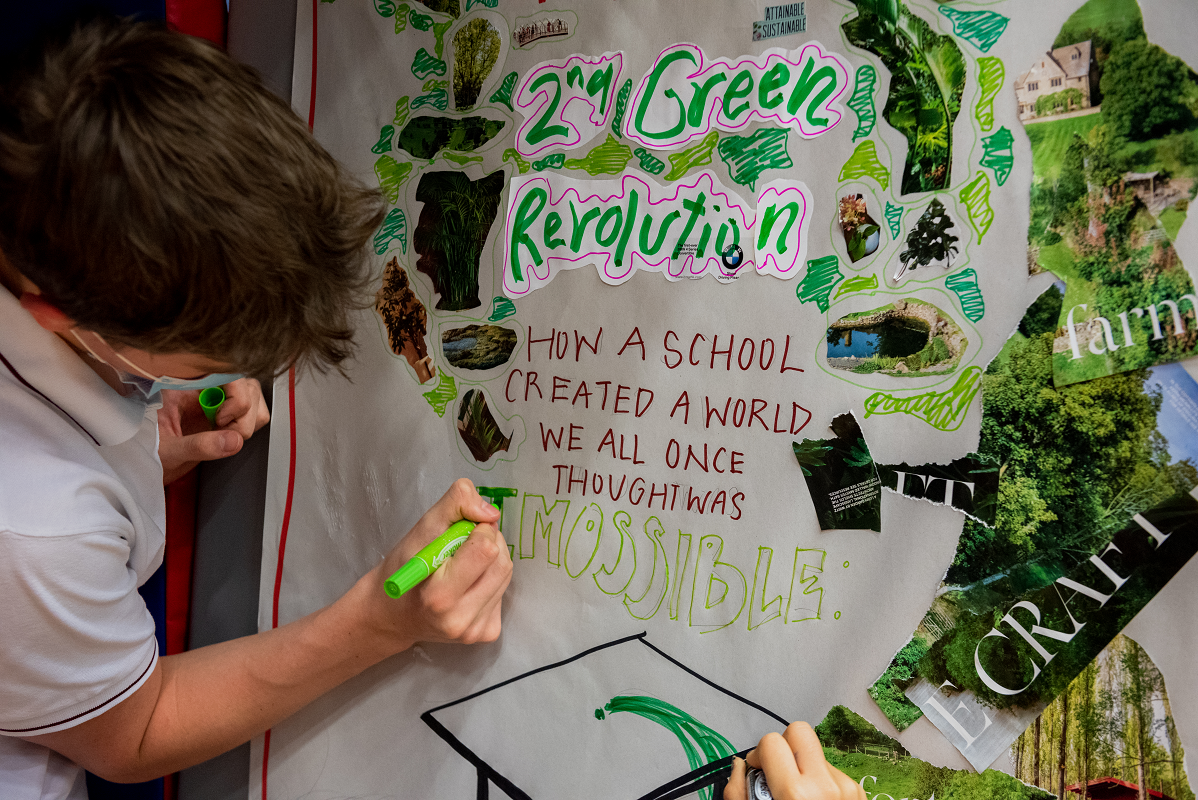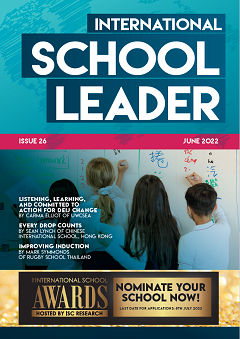by Sean Lynch
When Greta Thunberg stood outside the Swedish Parliament in September 2018 with a sign saying ‘School Strike for Climate’, she captured the imaginations of young people everywhere, including those at Chinese International School (CIS) in Hong Kong.
I recall that moment vividly, for I had only just joined CIS and was keen to discover what the students at my new school thought of her initiative. Their response was simple: sustainable development should be our number one concern. CIS’s most popular co-curricular club, Drop in the Ocean (DITO), had been established several years earlier and had an impressive track record of awareness-raising campaigns and service-learning activities. Yet at my inaugural meeting with them, DITO members were adamant about doing more and having a greater impact, with our own educational community as their focus.
“However, our journey of sustainable development over the past three years has been more than the tale of a school simply honouring its students’ voices; it has been the story of an entire educational community, from our alumni and parent association to our staff and external providers, empowering and equipping young people to effect meaningful change.”
Comments at that meeting suggested that our chances of being the change we want to see in the world will be higher in a setting where we have some influence. And if our school were to adopt the sustainability practices, which our planet needs from everyone, CIS might even be an example for others. These suggestions were right, of course. However, our journey of sustainable development over the past three years has been more than the tale of a school simply honouring its students’ voices; it has been the story of an entire educational community, from our alumni and parent association to our staff and external providers, empowering and equipping young people to effect meaningful change. What follows are six insights from that experience.
1. Find expertise to support sustainable development within your school
As we grappled with how best to develop a systemic approach to sustainability at CIS, we quickly realised that weaving the United Nations Sustainable Development Goals into the fabric of daily life at our school would benefit enormously from the catalyst of outside expertise. We scoured Hong Kong for that support and were fortunate to identify a local environmental consultancy called Metanoia with the scientific, technical and other skills that we were seeking.
In addition to bringing us the knowledge we needed, this firm shared our ethos of making sustainable development a student-led effort. Indeed, the terms of our contract were such that Metanoia would be serving our school as a whole, but its main interlocutor would be DITO.
2. Begin with an audit of your school’s approach to sustainability and learning
 Our first action was to organise an audit of everything educational and operational at CIS through the lens of sustainable development. Guided by Metanoia, DITO members conducted this whole-school project over the course of the 2019–2020 academic year, evaluating aspects of CIS that ranged from resource consumption and waste production to commuting practices and curricular frameworks, and narrating their accomplishments by means of social media, blogs and special events.
Our first action was to organise an audit of everything educational and operational at CIS through the lens of sustainable development. Guided by Metanoia, DITO members conducted this whole-school project over the course of the 2019–2020 academic year, evaluating aspects of CIS that ranged from resource consumption and waste production to commuting practices and curricular frameworks, and narrating their accomplishments by means of social media, blogs and special events.
Once completed, they published their findings in a 250-page written report with more than 100 recommendations for ways in which our school could become more sustainable. DITO students also made presentations to the CIS leadership team, board of governors and all stakeholders at a town hall meeting in 2020.
3. Align your international school values and mission to sustainable development
Building on this audit, our next initiative was to revisit our school’s guiding documents and to ensure that they reflected our prioritisation of sustainability. It had been more than a decade since we had last reviewed them and we felt that they should make explicit reference to sustainable development.
As an expression of identity and, more importantly, as a point of reference for us all in making decisions and otherwise endeavouring to live up to our reason for being as an educational institution, we wanted these documents to light our path forward. Following a series of community-wide surveys and focus groups, once more with particular attention to input from over 70 students in DITO, we adopted a set of values committing us to ‘care… for our planet’, as well as a mission statement calling on us to take responsibility for the ‘stewardship of our future’.
4. Make sustainable development strategic within your school
Based upon our whole-school audit, it was also evident to us that we needed to give sustainability pride of place in our new strategic plan, one which we intended to guide us to our 50th anniversary in 2033.
Rooted again within a community consultation and with the work of DITO continuing to serve as inspiration, this process culminated in a sustainability pledge. CIS would be in the vanguard of school-based sustainable development, with specific commitments to educating our students for sustainability and to achieving the twin objectives of carbon neutrality and zero waste.
By putting this promise at the centre of our nascent Vision ‘33, our aim is to ensure that sustainable development receives the time, funding and other resources it deserves, regardless of whatever else may lie ahead.
5. Reinvent international school governance around sustainable development
Another audit proposal that we immediately implemented was the creation of a whole-school sustainability council (SCO). Co-presided by the DITO chairperson and me, the SCO includes nine student delegates, as well as 14 alumni, staff, parent representatives and two Metanoia consultants. Magnifying our capacity for effective change, the SCO functions as a sounding board for the CIS leadership team and as a think tank to help our school meet the short, medium and long-term targets we are now setting for sustainability.
After only two years in operation, the SCO’s contributions have been substantial. It has researched, drafted and adopted sustainable procurement policies for stationery, textbooks and electronics. The SCO has also designed an environmental reform of our school uniform and played a central role in persuading our community to accept mandatory school busing. It is now driving the integration of sustainable development into our curriculum, from reception to Year 13.
6. Revamp your school curriculum around sustainability
How well we are actually educating our students on sustainability may be the toughest question we have asked ourselves since finishing our whole-school audit.
 On the one hand, we take advantage of every conceivable opportunity outside our core curriculum to advance the cause of sustainable development at our school, be it through the incorporation of mindfulness into our social and emotional learning programme; the creation of off-schedule sustainability-themed courses with Metanoia; the encouragement of weekend volunteering at the CIS urban farm; or the design of holiday-based environmental expeditions across our city with specialised non-governmental organisations, and more. On the other hand, we know that the most enduring educational gift we can make to our students is the inclusion of sustainable development in the scope and sequence of our formal curriculum. Galvanised by our SCO, we have therefore appointed a whole-school Sustainability Integrator with responsibility for coordinating this undertaking, one that is likely to involve significant changes in the content and organisation of learning at CIS, not to mention significant investment in the development and leadership of our faculty.
On the one hand, we take advantage of every conceivable opportunity outside our core curriculum to advance the cause of sustainable development at our school, be it through the incorporation of mindfulness into our social and emotional learning programme; the creation of off-schedule sustainability-themed courses with Metanoia; the encouragement of weekend volunteering at the CIS urban farm; or the design of holiday-based environmental expeditions across our city with specialised non-governmental organisations, and more. On the other hand, we know that the most enduring educational gift we can make to our students is the inclusion of sustainable development in the scope and sequence of our formal curriculum. Galvanised by our SCO, we have therefore appointed a whole-school Sustainability Integrator with responsibility for coordinating this undertaking, one that is likely to involve significant changes in the content and organisation of learning at CIS, not to mention significant investment in the development and leadership of our faculty.
Hopefully, these few pointers will be of use to other international schools. Standing as we all do at the junction of diverse citizens and cultures, with the extraordinary reserves of compassion and creativity which that location confers, the agency of our students is an unstoppable force for good. It will save our planet.
 Sean Lynch is Head of Chinese International School, Hong Kong.
Sean Lynch is Head of Chinese International School, Hong Kong.
Connect directly with Sean on LinkedIn


